Interested in food studies scholarship but not sure what it entails?
Look no further than this excellent overview of the interdisciplinary field.

Dickinson College Food Studies Certificate Program
Interested in food studies scholarship but not sure what it entails?
Look no further than this excellent overview of the interdisciplinary field.

What makes a particular food businesses successful? Learn more about the role of diner within the food system!
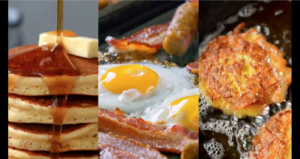
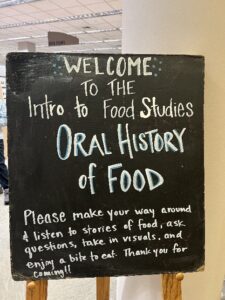
Welcome sign to Food studies showcase. Photo by Justin Wong.
This week’s class offered a rich exploration of foodways through the lens of individual projects. Foodways are the cultural, social, and economic practices that surround production, preparation, sharing, and consumption of food. Food is more than just a means to make yourself full; it carries a deeper meaning for many. The presentations illuminated the deeply personal and cultural connections we have with food, as well as the broader societal dynamics that shape these relationships.
It was quite interesting to hear the various projects from my classmates. Each presentation revealed a unique perspective on how food intersects with identity, tradition, and history. For instance, one student shared their experience with ravioli making, emphasizing its role in family traditions passed down and cultural pride. Another highlighted the impact of cultural assimilation on foodways and the importance of access to cultural foods. These projects brought to light the intricate ways food reflects and shapes our lives, offering a glimpse into the diverse experiences that unite us through shared meals.
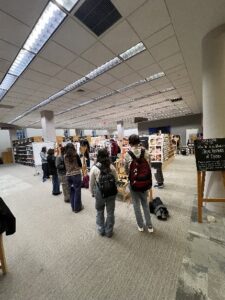
Students looking at posters from food studies showcase. Photo by Justin Wong.
A lot of the presentations connected to many of the various themes that we have covered throughout the semester. For example, themes of ethical consideration of food sourcing were echoed in stories about traditional and sustainable agricultural practices. We also had a class discussion about hunger, access, and sovereignty, which brought a deeper understanding of systemic barriers to food equity, a topic that surfaced in multiple presentations. Specifically, access to fresh produce versus cheaper canned alternatives highlighted the real-life challenges many face. These connections illustrate the interconnectedness of personal foodways and broader food systems, as well as the importance of addressing inequities within these systems.
My favorite part of the food studies showcase was seeing the visual aids from everyone’s presentation. The visual aid component really enhanced the experience of each listener. I loved that everyone had taken a different approach to visualizing their foodways projects. Some people used collages with attached 3D elements, some used maps to illustrate food origins, and even some people used high-level photography to show recipe steps. By the end of each presentation, I had a good idea about what food meant to the presenter’s interviewee and what each dish looked like. By the end of the event, I had even written down some of the dishes to try in the future.
I encourage you all to step out of your comfort zone and learn about your friends, family, or even a stranger’s foodway lens. It’s through these stories that we can appreciate the diversity and richness of each other’s foodways. For more information about our class please read this recent article in Dickinson Today!
Ethical food choices is a complex component of Food Studies scholarship. 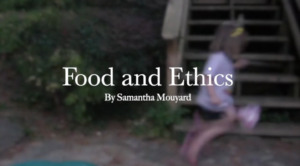
Join Samantha on her journey of understanding the impact of food purchases toward a more ethical future.
Throughout the semester, we have focused on a variety of perspectives and understandings of food and food studies. Rather than looking at food through a scientific or cultural lens, today’s class with Professor Adrienne Su focused on the incorporation of food as a theme in her art. Professor Su is a poet and professor of creative writing with five published books of poetry (Poetry Foundation, n.d.). She came to our class to discuss how food has “infiltrated her poetry” (A. Su, personal communication, December 5, 2024). As a creative writing minor, I was curious to see what Professor Su was going to discuss in class. I do a lot of creative writing in my spare time, but almost none of it is poetry and, prior to today’s class, I thought none of it was about food.
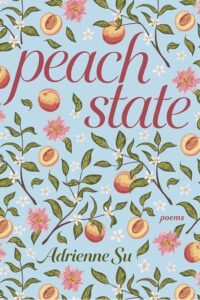
Image: The cover of Professor Su’s book of poetry Peach State, which features the poem Lychee Express. Food is a central theme in this book of poetry, exemplified by the title, which identifies Georgia as the “peach state” and the imagery of fruit on the cover. Image sourced from: University of Pittsburgh Press. (2019, March). Peach State. University of Pittsburgh. https://upittpress.org/books/9780822966562/
Food, as it is one of the most basic elements of human life, integrates itself into almost every aspect of our daily lives, including into our stories. Professor Su was gracious enough to show us the process of writing one of her poems, Lychee Express, during class. She described the inspirations behind the poem as a part of her desire to go through ordinary life “imagining the journey of fruits at the grocery store” (A. Su, personal communication, December 5, 2024). She also led the class through a ten-minute writing exercise where we used phrases from our oral history podcast assignment to free write prose or a poem and then discussed it.
Professor Su’s writing incorporates a great deal of what we have learned so far this semester. In her writing, she draws connection between food and her own history, her identity, and world history, with a particular emphasis on experiences from her daily life (Poetry Foundation, n.d.). As we discussed in class, Professor Su uses food to discuss historical comparisons and social/societal norms in Lychee Express (Poetry Foundation, 2019).
As I reflected on Professor Su’s use of food in poetry, I began to think about food as a theme in my own writing. In general, my fiction writing stems from a similar place to Professor Su’s talk: imagining a journey, process, or archetype that already exists in my life or in history, then expanding on it or imagining a different reality for it. Like Professor Su’s journey of grocery store fruits, my writing, which is often set in fictional worlds, usually incorporates food to explain the conditions of the world to the reader. Learning about Professor Su’s process, and how she thinks about food and poetry, led to the realization that food is a significant theme in my own writing. Professor Su’s talk emphasized how dynamic and important the field of food studies is, in that it is so often incorporated into art.
Works Cited:
Poetry Foundation (n.d.). Adrienne Su. Poetry Magazine. https://www.poetryfoundation.org/poets/adrienne-su
Poetry Foundation. (2019, January). Lychee Express. Poetry Magazine. https://www.poetryfoundation.org/poetrymagazine/poems/148684/lychee-express
In today’s class, we reflected on our recent field trip to the Hamilton Restaurant in downtown Carlisle. We discussed how the owner, Tom Mazias can create a friendly and nostalgic place for his customer base through his small restaurant and the personal relationships he made with recurring Dickinson alumni customers. This nostalgia comes from the restaurant having the same menu the older alumni had when they attended Dickinson. His dedication to having an unchanging restaurant is also seen in his employees, some of whom have been working there for around 40 years. Wow!
Our class discussion transitioned to comparing Dickinson Dining Hall’s and the restaurant’s customer bases. One of the main things we discussed was their different business models. Hamilton Restaurant focuses on its loyal customers through nostalgia and preserving heritage, while the dining hall focuses on student preferences with a changing menu. The Insider Higher Ed surveyed what students want in their dining hall experience. They found that “students emphasized a desire for accessibility, selection in food options and technology that aids in their dining experience” (Mowreader, 2024). For the Dickinson dining hall, there isn’t a way for the students to easily give feedback to the staff about the food and their experience. This differs significantly from my previous college, where there was an accessible way to provide feedback and even displayed student comments on their experience.

Talley, M. (2021, June 20). Destination Carlisle unveils New Historical Marker at Hamilton Restaurant. abc27 news. https://www.abc27.com/local-news/carlisle-west-shore/destination-carlisle-unveils-new-historical-marker-at-hamilton-restaurant/
I could not attend the visit to the Hamilton restaurant, so I couldn’t see how Tom Mazias ran it, but I do have experience working at a family-run bakery back home. What we discussed about the restaurant was similar to what I also remember noticing at the bakery. From what I know, the bakery has had the same items since it opened, with some new items added occasionally. Working at the bakery, I noticed that we had many recurring customers who I hear have been going there for years. Because of that, the owners developed personal relationships with them. The customers sometimes gift flowers to the owners and stay and chat with the owners. Sometimes, I have helped customers who got their wedding cake made there and are returning to have their anniversary or their children’s wedding cake made.
Works Cited:
Mowreader, A. (2024, January 17). What college students want from their dining provider. Inside Higher Ed | Higher Education News, Events and Jobs. https://www.insidehighered.com/news/student-success/health-wellness/2024/01/17/what-college-students-want-their-dining-provider
© 2025 Food Studies Academic Technology services: GIS | Media Center | Language Exchange
Theme by Anders Noren — Up ↑